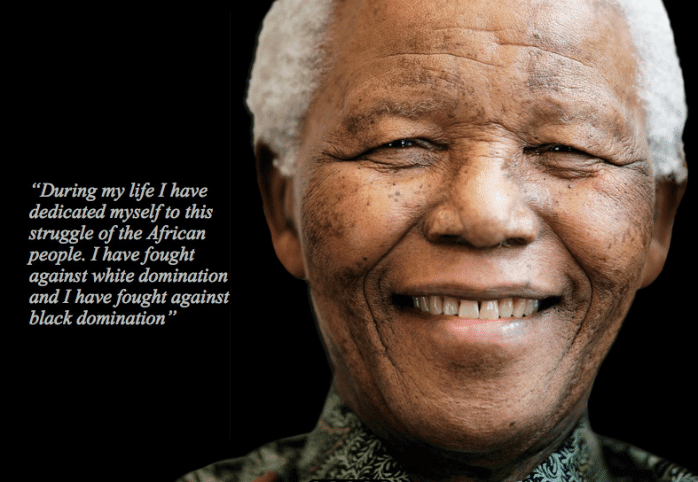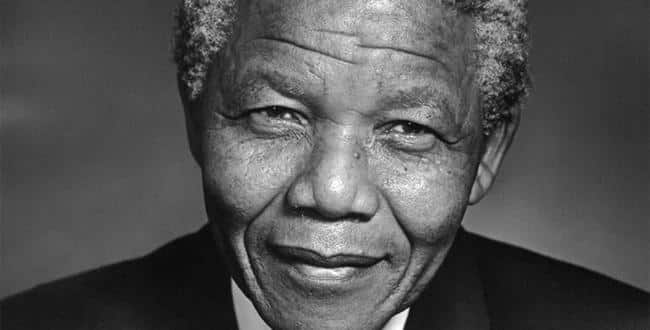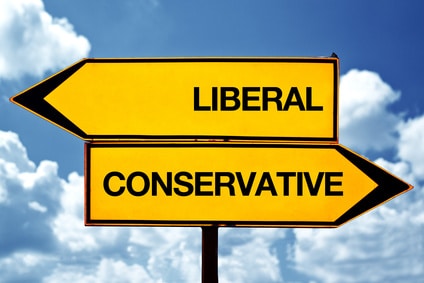
Nelson Mandela, who has died at the age of 95, was one of the world’s most revered statesmen. The former president and freedom fighter led the struggle to replace the apartheid regime of South Africa with a multi-racial democracy.
Nelson Rolihlahla Mandela,often also called by his Xhosa clan name Madiba, was born on 18 July 1918 in the village of Mvezo in Umtatu in South Africa’s Cape Province of the time. His birth name Rolihlahla means “troublemaker” in his native language, and as a kind of prophecy, he did stir quite some trouble while fighting against apartheid and for equal rights and peace throughout his life.
He comes from a royal Thembu family, a cadet branch who provided court councilors to the Thembu king. He was educated by missionaries who gave him his Christian name, Nelson. Later he studied law at Fort Hare University and the University of Witwatersrand. He first became politically active while living in Johannesburg and was influenced by anti-colonial politics. After joining the ANC (African National Congress) he took part in founding its Youth League, and eventually became the president of the Transvaal ANC Branch after the 1952 Defiance Campaign against the spread of apartheid policies implemented more and more by the Afrikaner nationalists of the National Party that come to power in 1948. His long line of anti-apartheid struggles, though he primarily supported non-violent methods of protest, saw him repeatedly arrested on charges of treason. Eventually he was sentenced to life imprisonment in 1962, one year after co-founding the militant Umkhonto we Sizwe (MK) in association with the South African Communist Party, which targeted the government through a bombing campaign. He had served 27 years in prison before being released in 1990 as a result of an international campaign lobbying for the termination of his sentence.
He became the president of the ANC and led negotiations with President F.W. de Klerk to abolish apartheid and establish multi-racial elections, which he won and became the President of South Africa in 1994. Mandela became the first black South African to hold the office, forming a Government of National Unity, establishing a new constitution, fighting institutionalized racism, poverty and inequality, introducing policies for the development of land reform and healthcare services. He declined to run for second term and focused on charitable work through the Nelson Mandela Foundation, fighting poverty and HIV/AIDS.
Mandela also gained international recognition through his involvement in the Pan Am Flight 103 bombing trial as a mediator between Libya and the United Kingdom, and for overseeing the military intervention in Lesotho, while he also acted as the Secretary General of the Non-Aligned Movement 1998-1999. He received over 250 awards for his endeavors and achievements, including a Nobel Peace Prize in 1993, the US Presidential Medal of Freedom and the Soviet Order of Lenin.
For South Africans he is the “father of the nation”, for the rest of the world one of the most deeply respected figures of modern day history.
revered– nagyra becsült
statesman – államférfi
former – előző, korábbi
freedom fighter – szabadságharcos
apartheid – fajüldözés
prophecy – jóslat
to stir trouble – bajt keverni
equal rights – egyenlő jogok
royal – királyi
cadet branch – katonatiszti/kadét ágazat
to provide – nyújtani, biztosítani, ellátni
court councilor – udvari tanácsos
to educate – tanítani, oktatni
missionary – misszionárius
to be influenced – befolyásolva lenni
to take part – résztvenni
to implement – létrehozni, végrehajtani, megvalósítani
to come to power – hatalomra kerülni
non-violent method – erőszakmentes módszer
protest – tiltakozás
repeatedly – ismételten
to arrest – letartóztatni
charge – vád
treason – árulás
to sentenced to – ítélni (bünt.)
life imprisonment – életfogytiglani börtönbüntetés
in association with – valakivel társulva
to target – (meg)célozni, célba venni
to serve in prison – (le)tölteni börtönbüntetést
to release – elengedni, szabadon engedni
as a result of – valaminek eredményeként
to abolish – eltötölni, megszüntetni
to establish – létrehozni, alapítani
constitution – alkotmány
institutionalized racism – intézményesített rasszizmus
poverty – szegénység
inequality – egyenlőtlenség
land reform – földreform
healthcare services – egészségügyi szolgáltatások
to decline – elutasítani, elhárítani
to focus on – összpontosítani valamire
charitable work – jótékonykodás
to gain international recognition – nemzetközi elismerést nyerni
involvement – részvállalás
mediator – közvetítő, közbenjáró
to oversee – felügyelni
military intervention – katonai beavatkozás
endeavor – törekvés, erőfeszítés
achievement – teljesítmény
respected – tisztelt





